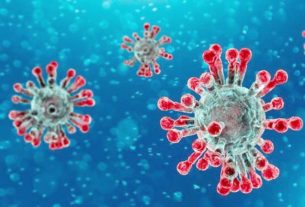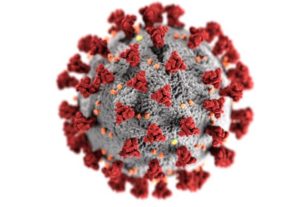From Our Bureau
22ND JUNE 2020
The Corona Virus (COVID-19) pandemic situation remained grim globally, with the confirmed cases across the world soaring to 88,60,331 and the death toll reaching 4,65,740 in the 216 affected countries and territories, according to the latest update from the World Health Organization (WHO).
Globally, American region continued to be the worst-hit with 43,70,519 confirmed cases and 2,21,771 deaths. Europe came next with 25,43,778 confirmed cases and 1,93,366 deaths. Eastern Mediterranean region reported 9,14,518 confirmed cases and 20,531 deaths.
South-East Asia region’s tally stood at 6,00,191 confirmed cases and 17,734 deaths. Western Pacific region recorded 2,05,911 confirmed cases and 7,329 deaths and African region registered 2,24,673 confirmed cases and 4,996 deaths. WHO Risk Assessment at global level remained very high.
With influenza season starting in the southern hemisphere, WHO has alerted countries to maintain vigilance for influenza and prepare for the upcoming influenza season during the COVID-19 pandemic. WHO recommends that countries optimize the Global Influenza Surveillance and Response System (GISRS) for both influenza and COVID-19 sentinel surveillance.
Countries are urged to (i) sustain influenza surveillance, (ii) report surveillance data to WHO FluNet and FluID or through regional platforms, (iii) send representative viruses to WHO Collaborating Centres of GISRS without delay, and (iv) maintain influenza vaccination programs according to WHO guidance.
A team of public health experts has been deployed to Tajikistan through the Global Outbreak Alert and Response Network (GOARN). The team will provide support to strengthen disease surveillance and laboratory testing to complement ongoing work by the COVID-19 response team in Tajikistan.
WHO and collaborating agencies provided support to health authorities in Uzbekistan to assess their options for COVID-19 testing and identify potential resources in-country to increase their laboratory capacity.
A nurse who is a refugee from Syria shared his experience as a COVID-19 responder in Turkey. His daily activities as part of the contact tracing team are “actively preventing the spread of the disease within communities, thereby protecting the health of hundreds of people”.
At the media briefing today, WHO Director-General Dr Tedros Adhanom Ghebreyesus observed “It seems that almost every day we reach a new and grim record. Yesterday, more than 183,000 new cases of COVID-19 were reported to WHO – easily the most in a single day so far. More than 8.8 million cases have now been reported to WHO, and more than 465,000 people have lost their lives.”
“Some countries are continuing to see a rapid increase in cases and deaths. Some countries that have successfully suppressed transmission are now seeing an upswing in cases as they reopen their societies and economies. All countries are facing a delicate balance, between protecting their people, while minimizing the social and economic damage. It’s not a choice between lives and livelihoods. Countries can do both,” he observed.
“We urge countries to be careful and creative in finding solutions that enable people to stay safe while getting on with their lives. We continue to urge all countries to double down on the fundamental public health measures that we know work. Finding and testing suspected cases works. Isolating and caring for the sick works. Tracing and quarantining contacts works. And protecting health workers works,” he added.
“At the same time, these measures can only be effective if each and every individual takes the measures that we also know work to protect themselves and others. Maintain physical distance. Continue cleaning your hands. And wear a mask where appropriate,” he added.
“Just as we do the things that we know work to prevent the spread of the disease, we’re also learning more about how to treat the sick. Although the data are still preliminary, the recent finding that the steroid dexamethasone has life-saving potential for critically ill COVID-19 patients gave us a much-needed reason to celebrate. The next challenge is to increase production and rapidly and equitably distribute dexamethasone worldwide, focusing on where it is needed most.
“Demand has already surged, following the UK trial results showing dexamethasone’s clear benefit. Fortunately, this is an inexpensive medicine and there are many dexamethasone manufacturers worldwide, who we are confident can accelerate production. Guided by solidarity, countries must work together to ensure supplies are prioritized for countries where there are large numbers of critically ill patients, and that supplies remain available to treat other diseases for which it is needed.
“Transparency and constant monitoring will be key to ensuring needs dictate supplies, rather than means. It is also important to check that suppliers can guarantee quality, as there is a high risk of substandard or falsified products entering the market. WHO emphasizes that dexamethasone should only be used for patients with severe or critical disease, under close clinical supervision. There is no evidence this drug works for patients with mild disease or as a preventative measure, and it could cause harm.
“WHO is also continuing to support countries with essential supplies of personal protective equipment and laboratory diagnostics. One way we’re doing that is through the COVID-19 Supply Portal, an online platform through which countries that need supplies can enter requests. So far, 48 countries have made requests for supplies, with a value of US$92 million. WHO is currently in the process of shipping more than 140 million items of personal protective equipment to 135 countries, 14,000 oxygen concentrators and millions of tests.
“Meanwhile, WHO is also working with countries to maintain essential health services. WHO recently surveyed countries to assess the impact of the pandemic on essential health services. Of the 82 countries that have responded so far, more than half have limited or suspended at least one service delivery platform, such as outpatient or inpatient services, or community-based care.
“Almost three quarters of countries reported that dental and rehabilitation services have been partially or completely disrupted. Around two-thirds of countries reported disruptions to routine immunization, diagnosis and treatment for non-communicable diseases and family planning and contraception. More than half of countries reported disruptions for mental health disorders, antenatal care, cancer diagnosis and treatment, and services for sick children.
“Countries are using a variety of strategies to deal with these disruptions, including triage, telemedicine and redirecting patients to alternative health facilities. Still, the consequences of these disruptions will be felt for many years to come. The world is learning the hard way that health is not a luxury item; it’s the cornerstone of security, stability and prosperity. That’s why it’s essential that countries not only respond urgently to the pandemic, but also that they invest in strong health systems domestically, and in global health security.
“Last year, world leaders came together at the United Nations General Assembly in New York to adopt a landmark political declaration on universal health coverage. Now more than ever, all countries must make universal health coverage a priority. It’s not a question of whether countries can afford to do this, it’s a question of whether they can afford not to,” the WHO Director-General observed. (eom)


